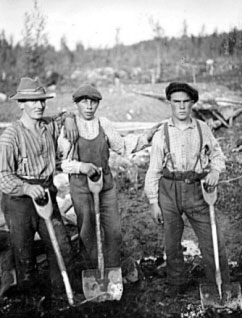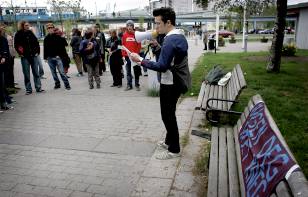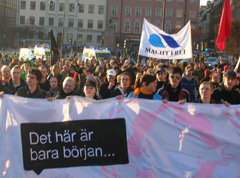Unemployment struggle in Gothenburg, Sweden1
The current situation: unemployment struggle as a weapon against capital
Unemployment is a weapon aimed at the whole of the working class; the unemployed are being squeezed making the unemployment as unbearable as possible, which leads to dumped wages and working conditions. Because when there is a reserve army of desperate people looking for work, the employers can pick and choose, and through the compulsion by the job centres2 they can force us into taking low paid as well as unpaid work through traineeship. The goal is that unemployment should become such a hell that underpaid wage slavery would appear as a better alternative. We are in fact made to lower our demands, and this they have succeeded with thoroughly.
Entire business concepts have the reserve army as a precondition. When I finished school no one would think about working at McDonald’s or Burger King. Today the situation is different, now practically everyone I know have had a job at a similar work place. The work places that were decent before are becoming more and more the same as these shit jobs. Some business concepts, for example call centres, are entirely based on the existence of terribly desperate job seekers.
The imposition of unemployment
Everything capital expose us to has the purpose of making us work – paradoxically so, even unemployment. The working class is fighting for a better life, capital is fighting for us working harder but under worse conditions. Society is a struggle between our wants and needs and the economic interests of the rich.
It was during the 90s that unemployment forced itself upon us. It was a part of a neo liberal wave that actually arrived relatively late in Sweden. The pretext was to combat inflation but those who were actually being fought were the workers. Working conditions and wages were to be worsened to allow higher profits, profits that later went to a small minority. Our radicalism and class struggle that was strong since the 70s were to be killed by means of a number of strategies where unemployment was one of most important ones.
The Swedish model of imposing unemployment was to work out an entirely home made economic depression. A deregulated central bank succeeded by giving away loans to create an enormous bubble of investment and lifting inflation to the roof. This inflation and the economic depression was then to be fought at any price, simply by unemployment. What was before as ‘The work principle’ (Arbetslinjen), full employment, was now history. The unemployment was never hard to produce; the enormous inflation led to companies’ bankruptcy. And we won’t easily forget the state’s belt-tightening policy – however young we might have been –, the austerity programmes set up in order to save the runaway economy: restraints, cutbacks, people were simply getting sacked.
Most important to remember: those who were most effected by the 90’s restraints were us workers. A lot of companies, in the middle of the depression, continued to increase their profits at the same time as we were expected to bear the burden in the form of harder work due to rationalisations and unemployment. This is how capitalism is. A crisis for us does not necessarily mean a crisis for them. With the economic crisis, the companies had got a number of instruments for increasing their profits at our expense. The radical working class during the 70s, which almost succeeded in tilting the capitalist economy, was now defeated.
How the offensive continued until today
But the offensive by capital did not end there. In fact it isn’t enough for capital to have a labour force reserve, it also has to do its job by making us desperately compete over the jobs. Many unemployed refused to accept shitty jobs and instead chose to stay on the unemployment benefit or social allowance. Some became long time unemployed and that was an even more serious problem. These persons got marked as unemployable and non-contributing to the dumping of wages and conditions of employment.

Apart from the imposition of guilt, the control and humiliation of unemployed is a central component of increasing the pressure on us. Executing officers in the job centres and the Social Insurance Administration (Försäkringskassan) have received an even harder task – their job is now to threaten the unemployed and to force them into accepting any (‘real’) job or unpaid trainee job. All the pointless courses and fucked up training schemes have as a purpose: to make the unemployed to even more want to get out of the humiliating claws of the job centres (Arbetsförmedlingen).
The new work principle: Workfare
The old work principle had full employment as its goal. As said before, this was abolished with the neo liberal wave that swept over the world during the 80th to 90th, when the so-called equilibrium unemployment was introduced, i.e. the unemployment rate should remain at a certain level in order to hold back inflation through wage dumping. But since this didn’t work entirely they tried to find another solution. If the unemployed weren’t competing over the jobs and became ‘unemployable’, unemployment didn’t work out as planned.

‘Ak-arbete’ in the 1930s.
The choice of work tasks was never a coincidence. Apart from that they did not require high expenses, they would also constitute hell on earth for the aid applicants. Even though machinery and labour saving tools were obtainable the assistance labourers were provided with the most simple possible tools. The fact that they were also situated in the sparsely populated areas when most of the unemployed came from big industrial cities implied that those who accepted an assistance labour often had to leave their place of residence and instead live in barracks together with other unemployed. An assistance labourer’s salary was never very attractive. Even though the management expected a satisfactory work, they only received a salary that matched up to two thirds of the lowest paid of the unskilled labourers on the spot. These inhospitable conditions would guarantee that the unemployed would prefer any other alternative for caring for the livelihood of himself and his family. Anyone who refused an assistance job was automatically excluded from all formsof unemployment benefits.
Behind the design of the unemployment policy, with its harsh conditions and large focus on testing the will to work of the unemployed, lied a widespread (inter-party) fear that people did not want to work. Terms such as ‘social benefit spirit’ and ‘social parasites’ were in swung. The fear got its support in the theories of how the labour market functioned: if only the workers demanded reasonable wage claims there would be work for everyone. Does it sound familiar?
We and the world
The reality of today’s labour-market policy that struck us all has nothing in common with the fine-looking picture the politicians and employers in Sweden and the world wants to make up. Neoliberalism and workfare are nothing new but a dirty chapter from the past that once again shows its ugly face – how nicely the theories of Milton Friedman, Göran Persson4 and Fredrik Reinfeldt5 are packed it is the eternally same tale, the rich get richer… Unemployment as a weapon against the working class has existed as an integrated possibility in the capitalist system all since the infancy of capitalism.
Today’s politicians and employers do all they can in order to make us abide the situation. Both parties blame globalisation and wrap the discussion over unemployment in heaps of nonsense and incomprehensible arguments. The employers threatens to move abroad and the politicians give them more power. But just as capital’s workings are global and to a certain extent always have been global, the resistance is global. In Paris, there were strikes and suburbs were burning, in Germany job centres were occupied and in Argentina the country was congested due to roadblocks. These are only a few examples.
Capitalism does not only control us; through the struggle we carry out we also control it. If we stand passive we become victims, but if we act we are forcing the system to meet some of our needs. Since our struggle and our experiences are being developed we are advancing our positions and arrives one step closer to a classless society.
Capitalism is global and our struggles becomes most effective if they free and unrestrained may grow and develop. To hold back because the working class of another country have not come far enough is nonsense. Someone has to go in the front in order to get something done. Unemployment is today a weapon aimed at us, unemployment struggle then becomes a weapon pointed at capital. In the 70s flexibility and the right to change jobs were a strength because of a low unemployment rate – workers started to dictate the terms. It is time for us, once again, to move in that direction – more power to workers with or without work is the only solution. Plus jobs6 and all other forms of wage dumping policies need to be fought.
From individual strategies to collective action – unemployment struggle here and now
The goal has never been to gather around empty phrases, or to create organisations for that matter. The goal is to strengthen class struggle. This is being done most effectively by viewing organisations and means of struggle as weapons in our struggle, and never to view them as ends in themselves.
How petty it may seem, spreading peaces of advice on how to deal with your executing officer, this might be the thing that makes the difference between a decent life and outcast for a lot of people. To step by step arm our class with weapons is our task. We shall deliver strategies and weapons that brings home victories. Our goal is not to spread myths or wave flags but to fight capital with class struggle, a struggle we carry out together for our needs and wants.
Background
In the activist group Stubin we arrived at the idea to start a campaign against the job centres (Arbetsförmedlingen) and took the (in-) popular expression already used ‘Arbetsförnedringen’ (‘The work humiliation’). We started with making a leaflet and carried through a quick visit to the local jobcentres in town. There, instead of using the classic tough activist confrontation we turned directly to the unemployed at the spot. We offered them coffee, cakes and actually tried to be as friendly as possible. The visits were sometimes in a larger group – with the coffee and the cakes – and sometimes more sneaky, when two people tiptoed around in the job centres and handed out. During these occasions we also made interviews with unemployed.
Leaflets still going strong
The result from this and the following handouts were amazing, almost everyone who received a leaflet read it. As an activist and politically active you are not quite often used to that people pay attention to what you say, the regular hymn being suspicion.
To say something about the content: In the leaflet we explained the reasons for unemployment and stressed that one should not feel personally guilty for a problem in society. Then we pointed at a number of simple tips which shows how to limp along through unemployment with all its trap doors.
Our actions came in part out of a critique of activism and then our of our own experiences. It is important to see that those we turn to, in this case unemployed, do not need to be reached via the roundabout way of activist and symbolic acts, at least not in some cases. Our aim with the action was never to strike against the job centre but to use it as an arena for sharing strategies of resistance. In a job centre you have to wait, and you hate it! If someone hands you a text and, in addition, it is something easy to agree with, and furthermore offers you concrete tips, clear as hell you read it!
The aim has been to spread self activity and simple advices. A good advice may make the difference between being broke and not. To teach people what are their rights and to expand rights via a few simple strategies, for example manipulate executing officers, is a good first step towards creating a broad class consciousness with no empty phrases.
Towards collective struggle and organisation
In springtime leaflet handouts were in full swing and on the next step some of us in Stubin went in and sparkled new life in the for many years long inactive Unemployment Committee in Gothenburg’s LS of SAC7. Working within the local organisation gave some steadiness to our earlier nonexistent funds. During this time the Arbetsförnedringen campaign, with the Unemployment Committee in tow, we also kept contact with SAC’s folk high school course of unemployed anarcho-syndicalists which was held at Angereds folkhögskola.
The next step was to prepare a seminar which went under the name Unemployment and Insecure Employment Contracts. We put up posters in almost all of the city’s job centres and in town. The seminar had a relatively good attendance and even if many of the guests were already activists a few ‘ordinary people’ came. At the seminar the Unemployment Committee, Arbetsförnedringen and struggling unemployed were represented in a panel. We lectured about the causes and effects of unemployment and about how labour movements all around the world and in the Swedish history have taken the fight for the conditions of the unemployed and against workfare as well as giving concrete tips.
The end discussion came to be about how we might learn from these struggles and how we should organise them today. The result became that we gathered email addresses and invited people to an organising meeting. This resulted in AKO – Arbetslösas kamporganisation (‘The Fight Organisation of Unemployed’). AKO became a network where Stubin, autonomous activists and local organisations of SAC could come together and wage a combined resistance against today’s workfare and humiliation.
AKO and the struggle against workfare
AKO had a few relatively well attended meetings with people from Gothenburg and environs. At the very same time of the formation a nasty workfare program was on the way of being opened in the city. The district council in Biskopsgården thought that the unemployed of the suburb should work almost fulltime in order to keep their benefits, and a job centre (Äpplet – ‘the apple’) where five hundred slave jobs at an opening stage would be mediated, was being set up in full blast. The goal was to, in time, assemble even more slave services. We wanted to strike swiftly and made plans to mobilise already at the day of kick off. The task was to close down the damn shit before it would even open.
We were effective in the arrangements and produced leaflets that were translated into several languages; the entire suburb was repapered with pictures of politicians in the city councils, responsible officials and union bigwigs. ‘Your Local Slave Keepers’ was the message. A pretty yellow-red poster with the message ‘No wage – No work’ was also put up. Two of us also went through media training to prepare us for the worst. We had a discussion about equal representation but since no one was to be in the limelight we had to accept the situation…
But not everything was that successful. We invited to formal meetings instead of pushing for activity as the central thing. Too much energy got wasted on making everyone involved in every decision. With the wisdom of hindsight the meetings of planning should have been on a voluntarily basis and not necessarily gathered everyone. We should meet in the activity, in the struggle. Those who want to should off course be in the arrangements but too often formal meetings are needless and more time consuming than they are useful. That communication was centralised via an email address made these problems worse. It was hard for individual members to come with initiatives and the driving core had to work their asses off in order to make more participatory processes start.
The idea of this ‘self criticism’ is not that we are to become a service organisation for weekend activists but to make people take part out of interest/need. The activity must also be social and, expectantly, give results. With this approach, hopefully, the organising will come to pass out of need rather than in accordance with an organisational or idealist principle.
However, the practical solutions of these problems are very simple: an email list solves the communication problem, work groups accepts the arrangements and the discussions take place over the email list. You should continue to meet but not in the form of meetings but rather at a café where everyone’s experiences is at the centre.
Evaluation of the manifestation against ‘the Apple’
The manifestation against the job centre ‘the Apple’ was more than a simple manifestation. We made use of several strategies in order to achieve to our goal which we in part reached. The Apple’s room for five hundred people shrunk to fifty and the project was hidden away.

Manifestation against ‘the Apple’
Media as a strategy was a just as important one. We prepared ourselves in advance by sending press releases and to spread our voice to the radio and news papers. Gothenburg’s Independent Newspaper wrote an article. And faced with the big day we hade prepared us to handle media at the spot. We were facing the worst but, instead it became a shock for us – TV4 and Gothenburg Post played us right in our hands and the publications of interviews and the pieces of writing about the manifestation worked undoubtedly in our favour. TV4 broadcasted on prime time when one of us railed out the chief of the city council. Liberal GP was also forced to defend itself against us – not by branding us but through a perplexed editorial where they desperately tried to lie away unemployment and wage dumping. One may ask: why did the media swallow the bait? In part it may have been because it was hard for the media to define who acted – we were not a party, nor any ‘extreme left anarchist group’. Maybe they for once saw us as angry workers and unemployed. To leave the worn out radical phrases at home might sometimes be a good choice.
The hanging out of politicians and bigwigs was also a strategy. To put pressure on union VIPs and politicians might be profitable. They mustn’t get away that easily. As long as you are not appealing, pressure on politicians can be a strategy.
The manifestation was a symbolic act and a large point was that it wash held at the very opening. This showed how fast we could mobilise, and that we later threatened with more extensive mobilisation was for certain also lucrative. Our strength was not the number of people we were mobilising for the manifestation (it was raining and the attendance was barely twenty people). The main point was that we filled the manifestation with threats that both employers and politicians had to take seriously. If we had only been standing on the square and whined, surely the Apple would have got their five hundred. Since it was – for the most part – the employers who backed out of the project, the threats and not only the media circus must have had effect. No one wants to employ a negligent worker.
If we dare to look forward
To close down single workfare projects are important but to all the time act as fire-fighters and defensive is no solution. Workfare projects are hard to justify but will in time be carried out more cleverly, more hidden and be harder to strike at. And it is not horrible job centres which are our main enemy, but: the pressure on the unemployed, different forms of low and unpaid forced labour. That unemployment can be used as way to dump wages and conditions of employment is a problem for everyone.
To fight such a big problem in society we need to spread methods of struggle that are easy to take hold of and to carry out. The last few days we, AKO, have started a café for unemployed in Biskopsgården. The idea about the café is that it could facilitate the sharing of experiences and also offer collective solutions to the problems we are having. Is the executing officer at the job centre is mean and nasty to one of us we have to appear in a group. We need to learn to act collectively. Perhaps not in the first place via tough activist groups but rather through simple but effective methods. Often mom and dad are better to bring with you to the executing officer than a bunch of funny activists.
The groups for collective action already exists: groups of friends, workmates, classmates. Wherever we are there are conditions for collective struggle, and often it is already there. Physical meeting places will also be necessary. The café is an attempt to this, but group visits with leaflet handouts on job centres is another way to meet.
An important part of today’s unemployment situation is also the unpaid labour. Instead of employing new people, the company is replacing services with trainee jobs. By threatening with different forms of sabotage, goslow, theft, direct sabotage, we managed to make the employers who was going to use the unemployed in Biskopsgården to pull out. There are opportunities to spread this form of struggle to any sort of unpaid / low paid work, to make it a more general struggle. Today a lot of unemployed are actually working and in just one workplace there are heaps of ways to struggle. The only thing you have to do really is to work faulty or bad, or not to work at all. Our best weapon against capital is to refuse doing what we are expected to do – work.

This is only the beginning…
Unemployment struggle is connected to workplace struggle and students struggle. No matter if we for the time being are working, studying or are unemployed, we are workers with common interest. Capital forces us to work as students in schools, as trainees and as workers. These mutual interests is a condition for struggle. The next one is that we know how the struggle shall be fought, that we arm ourselves with our own and others experiences of struggle, that we start to trust in ourselves and in one another.
Notes
1. This is a slightly modified translation of a script written by AKO, Arbetslösas kamporganisation (‘The Fight Organisation of Unemployed’), that was used for a number of lectures in 2006 in Sweden. Translators note.
2. The job centres in Sweden has the name ‘Arbetsförmedlingen’. These offices are a part of the state institution Arbetsmarknadsverket which has 10,000 employed. Translators note.
3. Note that the concept of ‘workfare’ is actually very new in Sweden. Translators note.
4. The Swedish prime minister since 1996. Translators note.
5. The leader of the right wing opposition. Translators note.
6. A ‘reform’ presented by the ruling social democratic party. Translators note.
7. That is the local organisation (LS) of the anarcho-syndicalist union Sveriges Arbetares Centralorganisation <www.sac.se>. Translators note.
The people writing the thing in Swedish are hopeless, not putting the original version on the web. (We’re not going to do it…)